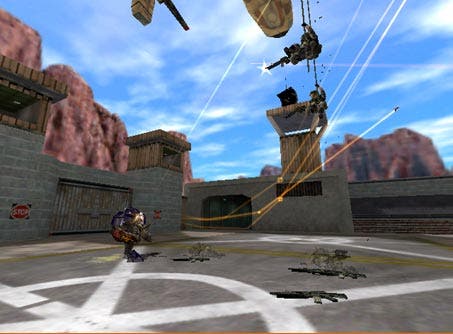British Army trains with Half-Life
“I’ve had extensive training, the kind that’s indistinguishable from the real thing!”
When the American Army announced its own videogame project, to be released for free via the Internet, it wasn't the first time that the military had taken an interest in the potential benefits of videogames, and it wasn't to be the last. Back in the day we remember several page spreads in Wired with military consultants waxing lyrical about their Doom-based simulators, but on this side of the pond things are now a little more up to date, with the British Army resorting to a Counter-Strike clone from technology firm QinetiQ. Although admittedly several years old, Half-Life is still considered one of the pivotal moments in gaming history, and Counter-Strike is undeniably the most popular first person shooter modification of all time, so the boys from the Ministry of Defence obviously knew how to pick 'em. None of that fancy graphics palaver - just meaty gameplay. Like CS, the specially developed Half-Life modification from QinetiQ is primarily keyboard and mouse controlled, and troops work as a unit to track down and confront the enemy, dropping from the action should they take a bullet at any point. The hope is that soldiers can try out new weapons and new tactics and gauge their capabilities and effectiveness without encountering real bullets and bombs. The MOD hopes that this will reinforce the vital lessons taught during more traditional exercises. It's good to see that the military is wise to the dangers of battle simulators. Speaking to the BBC, Major Bruce Pennell of the army's Logistics Corp, said that "obviously, being killed in the virtual world isn't quite so serious. We don't have virtual officers writing letters to the dead soldiers' virtual parents, but we'd hope the games are authentic enough to reinforce good teaching." The MOD, currently evaluating the system, has explained that one possible application would be to allow troops to practice real life missions ahead of actual engagement. Musing over the idea, Major Pennell was cautious. "You would have to make sure the environment you are modelling is as accurate as possible," he said. "What you don't want to happen is for a soldier in a real situation to run around a corner to find the door that existed in the virtual environment, only to find in the real world the door is not there." It is not clear whether terrorists in this unnamed simulation are being played by other soldiers or whether they are AI-controlled, but one would hope that the MOD is not relying on poor aim and enemies getting snagged on scenery. Solid Snake had a point about VR, you know. Related Feature - Operation Patriotic Video Game


